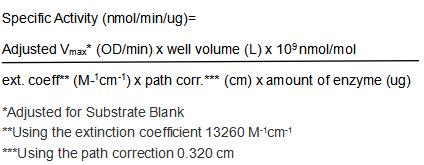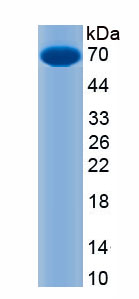Active Acetylcholinesterase (ACHE)
ARAChE; N-AChE; YT
- Product No.APB447Mu61
- Organism SpeciesMus musculus (Mouse) Same name, Different species.
- Buffer FormulationPBS, pH7.4, containing 5% Trehalose.
- Traits Freeze-dried powder
- Purity> 90%
- Isoelectric Point5.9
- ApplicationsCell culture; Activity Assays.
- DownloadInstruction Manual
- UOM 10µg50µg 200µg 1mg 5mg
- FOB
US$ 356
US$ 890
US$ 1780
US$ 5340
US$ 13350
For more details, please contact local distributors!
ACTIVITY TEST

The classical role of ACHE is to terminate cholinergic neurotransmission by hydrolysis of acetylcholine (ACH). ACHE is thought to be involved in the pathology of Alzheimer's disease (AD) by accelerating the assembly of A beta peptides into fibrillar species through forming complexes with A beta via the peripheral anionic site on ACHE. ACHE inhibitors have been used to delay symptoms of AD patients by virtue of their ability to enhance ACH availability, as well as reduce amyloidogenesis and subsequent neurotoxicity. Its involvement in the cholinergic anti-inflammatory pathway connects ACHE with a possible marker of low-grade systemic inflammation in obesity, hypertension, coronary heart disease, and AD. The activity of recombinant mouse ACHE was measured by its ability to cleave Acetylthiocholine in the assay buffer 0.1 M sodium phosphate, 0.05% (w/v) Brij-35, pH 7.5. 50 μL of various concentrations of rmACHE (diluted by Assay Buffer) was added into the 96-well clear plate and the reaction was started by the addition of 50 µl substrate mixture of 200 uM acetylthiocholine and 100 uM DTNB. The final well serves as a negative control with no rmACHE, replaced with 50μl assay buffer and 50 ul substrate mixture. Read plate in kinetic mode for 5 minutes at an absorbance of 405 nm. The specific activity of recombinant mouse ACHE is >2200 nmol/min/µg.
USAGE
Reconstitute in 10mM PBS (pH7.4) to a concentration of 0.1-1.0 mg/mL. Do not vortex.
STORAGE
Avoid repeated freeze/thaw cycles. Store at 2-8°C for one month. Aliquot and store at -80°C for 12 months.
STABILITY
The thermal stability is described by the loss rate. The loss rate was determined by accelerated thermal degradation test, that is, incubate the protein at 37°C for 48h, and no obvious degradation and precipitation were observed. The loss rate is less than 5% within the expiration date under appropriate storage condition.
GIVEAWAYS
INCREMENT SERVICES
-
 BCA Protein Quantification Kit
BCA Protein Quantification Kit
-
 Molecular Mass Marker for Protein
Molecular Mass Marker for Protein
-
 Monoclonal Antibody Customized Service
Monoclonal Antibody Customized Service
-
 Polyclonal Antibody Customized Service
Polyclonal Antibody Customized Service
-
 Protein Activity Test Experiment Service
Protein Activity Test Experiment Service
-
 Electrophoretic Mobility Shift Assay (EMSA) Experiment Service
Electrophoretic Mobility Shift Assay (EMSA) Experiment Service
-
 Buffer
Buffer
-
 Lentivirus Packaging Experiment Service
Lentivirus Packaging Experiment Service
-
 Adenovirus Packaging Experiment Service
Adenovirus Packaging Experiment Service
-
 Real Time PCR Experimental Service
Real Time PCR Experimental Service
-
 Spike RBD Protein (S-RBD)
Spike RBD Protein (S-RBD)
-
 Protein G
Protein G
-
 Protein A
Protein A
| Magazine | Citations |
| Acta Histochem Cytochem. | The Effects of Exercise-induced Fatigue on Acetylcholinesterase Expression and Activity at Rat Neuromuscular Junctions PubMed: PMC2775104 |
| Applied Biological Chemistry | Positive enhancement of Lactobacillus fermentum HY01 on intestinal movements of mice having constipation 10.1007/s13765-017-0327-3 |
| Molecular Nutrition & Food Research | Thymoquinone Can Improve Neuronal Survival and Promote Neurogenesis in Rat Hippocampal Neurons Pubmed:29277983 |
| Inflammation | Feishu Acupuncture Inhibits Acetylcholine Synthesis and Restores Muscarinic Acetylcholine Receptor M2 Expression in the Lung When Treating Allergic Asthma Pubmed:29520557 |
| International Journal of Molecular Sciences | In Vitro Evaluation and Docking Studies of 5-oxo-5H-furo [3, 2-g] chromene-6-carbaldehyde Derivatives as Potential Anti-Alzheimer's Agents Pubmed: 31683761 |
| BMC Anesthesiology | Cerebrospinal fluid cholinergic biomarkers are associated with postoperative delirium in elderly patients undergoing Total hip/knee replacement: a … Pubmed: 32988385 |
| PHYTOMEDICINE | Thymoquinone administration ameliorates Alzheimer's disease-like phenotype by promoting cell survival in the hippocampus of amyloid beta1-42 infused rat … Pubmed: 32920292 |
| PLoS One | Neuroprotective effect of sodium alginate against chromium-induced brain damage in rats Pubmed:35421180 |
| scientific reports | Neuropsychopharmacological profiling of scoparone in mice Pubmed:35039558 |
| SAUDI J BIOL SCI | Aqueous Ajwa dates seeds extract improves memory impairment in type-2 diabetes mellitus rats by reducing blood glucose levels and enhancing brain … Pubmed:35531250 |
| Saudi Pharmaceutical Journal | Sukkari dates seed improves type-2 diabetes mellitus-induced memory impairment by reducing blood glucose levels and enhancing brain cholinergic … Pubmed:35812141 |
| Catalog No. | Related products for research use of Mus musculus (Mouse) Organism species | Applications (RESEARCH USE ONLY!) |
| APB447Mu61 | Active Acetylcholinesterase (ACHE) | Cell culture; Activity Assays. |
| RPB447Mu01 | Recombinant Acetylcholinesterase (ACHE) | Positive Control; Immunogen; SDS-PAGE; WB. |
| RPB447Mu02 | Recombinant Acetylcholinesterase (ACHE) | Positive Control; Immunogen; SDS-PAGE; WB. |
| EPB447Mu61 | Eukaryotic Acetylcholinesterase (ACHE) | Positive Control; Immunogen; SDS-PAGE; WB. |
| PAB447Mu02 | Polyclonal Antibody to Acetylcholinesterase (ACHE) | WB; IHC; ICC; IP. |
| PAB447Mu01 | Polyclonal Antibody to Acetylcholinesterase (ACHE) | WB; IHC; ICC; IP. |
| LAB447Mu71 | Biotin-Linked Polyclonal Antibody to Acetylcholinesterase (ACHE) | WB; IHC; ICC. |
| SEB447Mu | ELISA Kit for Acetylcholinesterase (ACHE) | Enzyme-linked immunosorbent assay for Antigen Detection. |
| LMB447Mu | Multiplex Assay Kit for Acetylcholinesterase (ACHE) ,etc. by FLIA (Flow Luminescence Immunoassay) | FLIA Kit for Antigen Detection. |







